
ai-hero
AI Hero's open-source examples and course material. Learn AI Engineering with a single repo.
Stars: 598
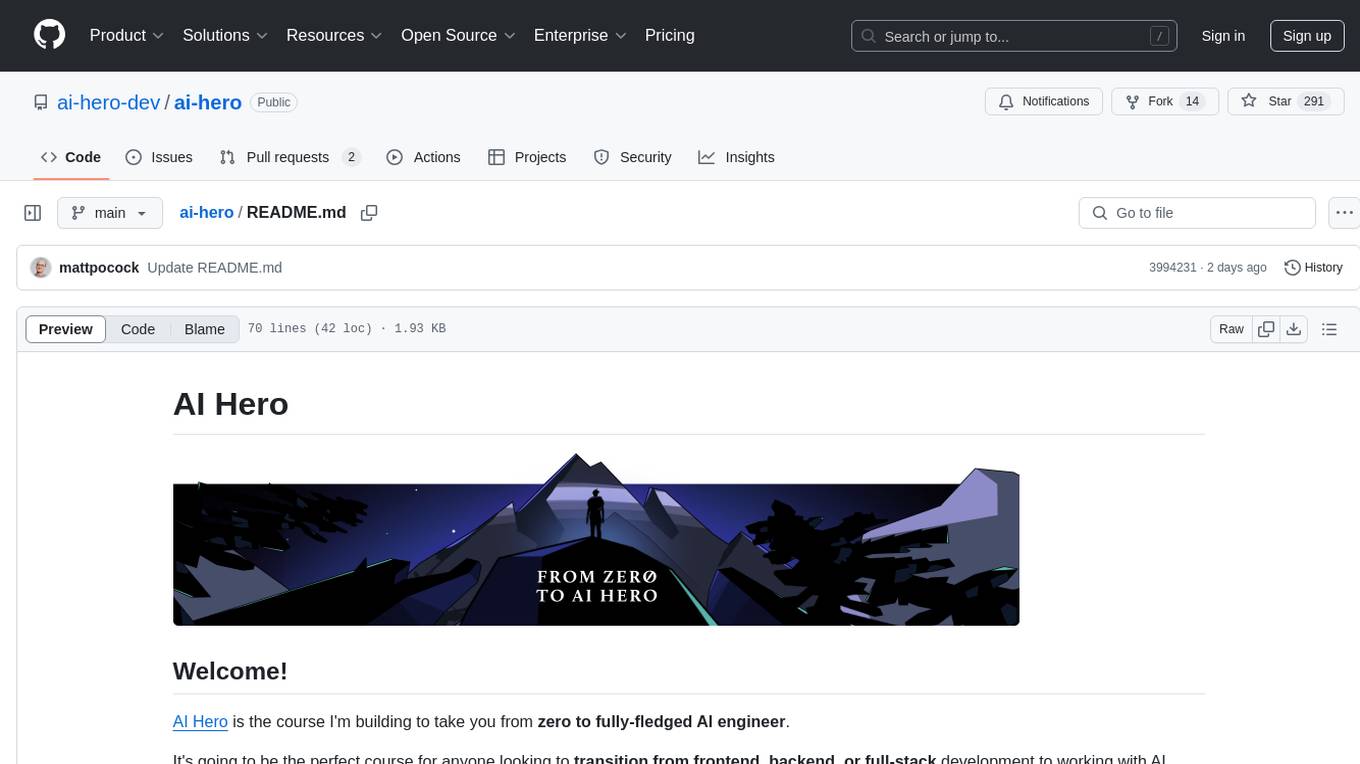
AI Hero is a course designed to help individuals transition from frontend, backend, or full-stack development to working with AI. The course includes examples, exercises, libraries & SDKs, and articles. The repository provides self-contained code samples to demonstrate various AI concepts and techniques. Users can follow the quickstart guide to install dependencies, set up API keys, and run examples. AI Hero aims to equip learners with the skills needed to become fully-fledged AI engineers.
README:
AI Hero is the course I'm building to take you from zero to fully-fledged AI engineer.
It's going to be the perfect course for anyone looking to transition from frontend, backend, or full-stack development to working with AI.
I'm open sourcing most of the code for the course, including:
- Examples
- Exercises
- Libraries & SDKs (like Evalite, my evals framework)
- Articles
Following repo notifications can be pretty painful, so get on my newsletter to stay up to date.
The bit I'm currently working on is the examples directory.
Each example is a self-contained, runnable code sample that demonstrates a concept or technique.
Anything marked with TODO is, well, you get it.
Let's get you running your first example.
You'll need Node.js installed to run the exercises and examples. LTS (Long Term Support) is recommended.
# Installs all dependencies
pnpm installCreate a .env file in the root of the project with the following content:
# Your OpenAI API key
OPENAI_API_KEY=your-api-key
# OR your Anthropic API key
ANTHROPIC_API_KEY=your-api-keyI'll be adding a guide on running the examples with local models soon.
Runs the first example of examples/vercel-ai-sdk. Each example links to a corresponding article on AI Hero.
pnpm run example v 01For Tasks:
Click tags to check more tools for each tasksFor Jobs:
Alternative AI tools for ai-hero
Similar Open Source Tools

ai-hero
AI Hero is a course designed to help individuals transition from frontend, backend, or full-stack development to working with AI. The course includes examples, exercises, libraries & SDKs, and articles. The repository provides self-contained code samples to demonstrate various AI concepts and techniques. Users can follow the quickstart guide to install dependencies, set up API keys, and run examples. AI Hero aims to equip learners with the skills needed to become fully-fledged AI engineers.
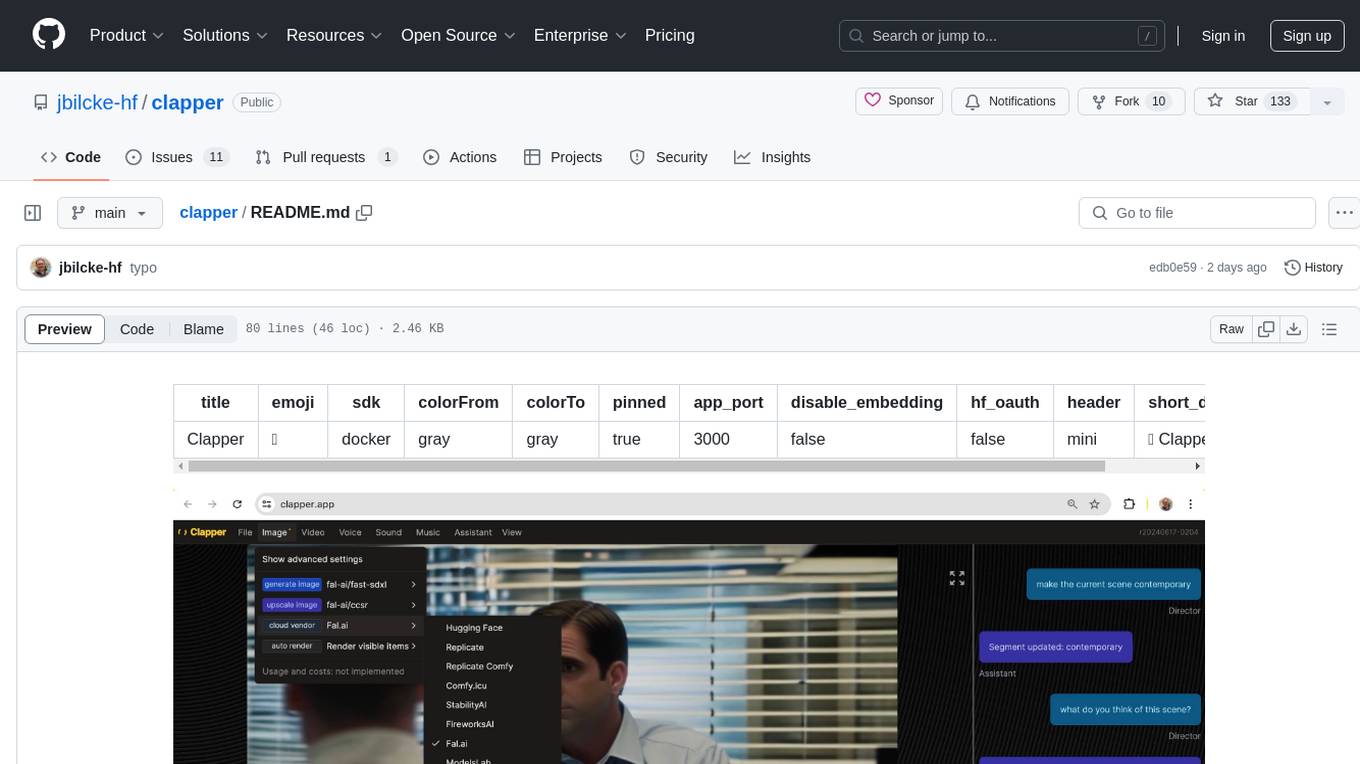
clapper
Clapper is an open-source AI story visualization tool that can interpret screenplays and render them into storyboards, videos, voice, sound, and music. It is currently in early development stages and not recommended for general use due to some non-functional features and lack of tutorials. A public alpha version is available on Hugging Face's platform. Users can sponsor specific features through bounties and developers can contribute to the project under the GPL v3 license. The tool lacks automated tests and code conventions like Prettier or a Linter.
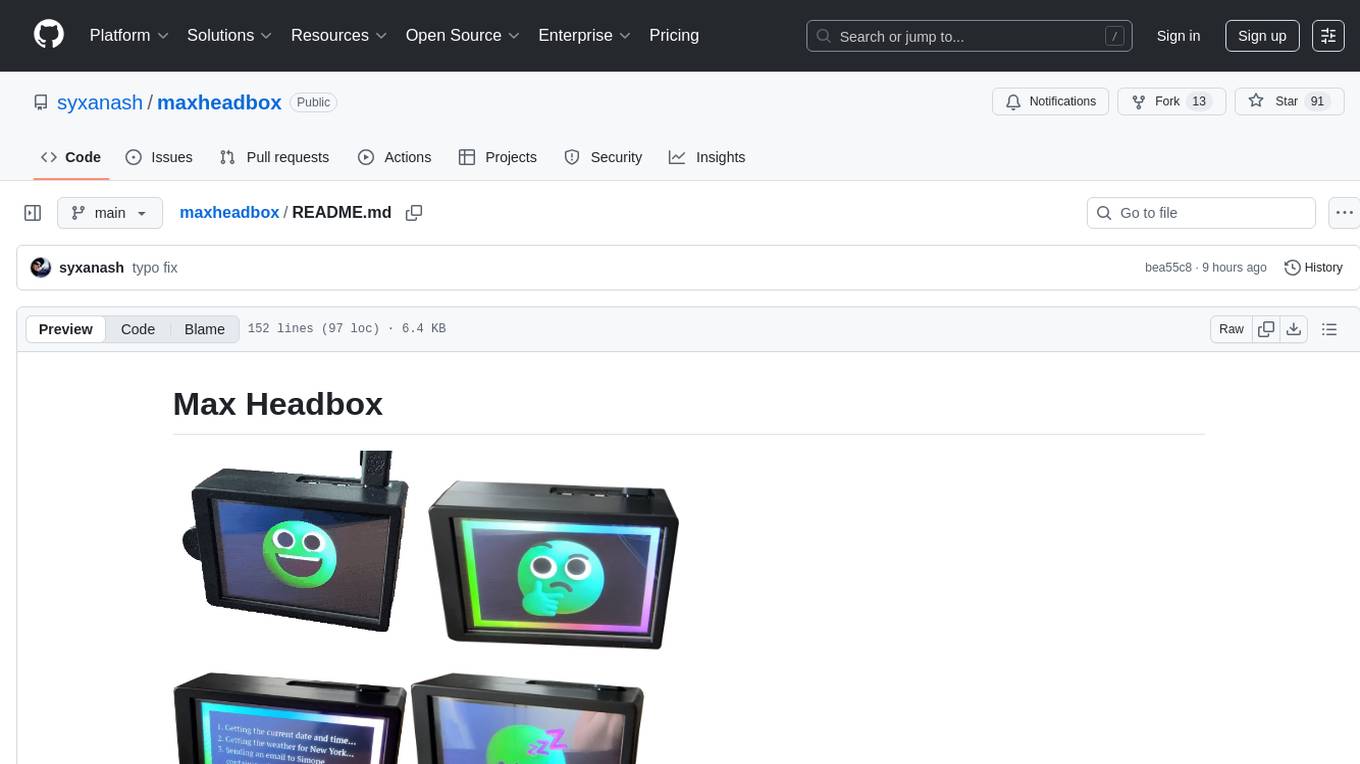
maxheadbox
Max Headbox is an open-source voice-activated LLM Agent designed to run on a Raspberry Pi. It can be configured to execute a variety of tools and perform actions. The project requires specific hardware and software setups, and provides detailed instructions for installation, configuration, and usage. Users can create custom tools by making JavaScript modules and backend API handlers. The project acknowledges the use of various open-source projects and resources in its development.
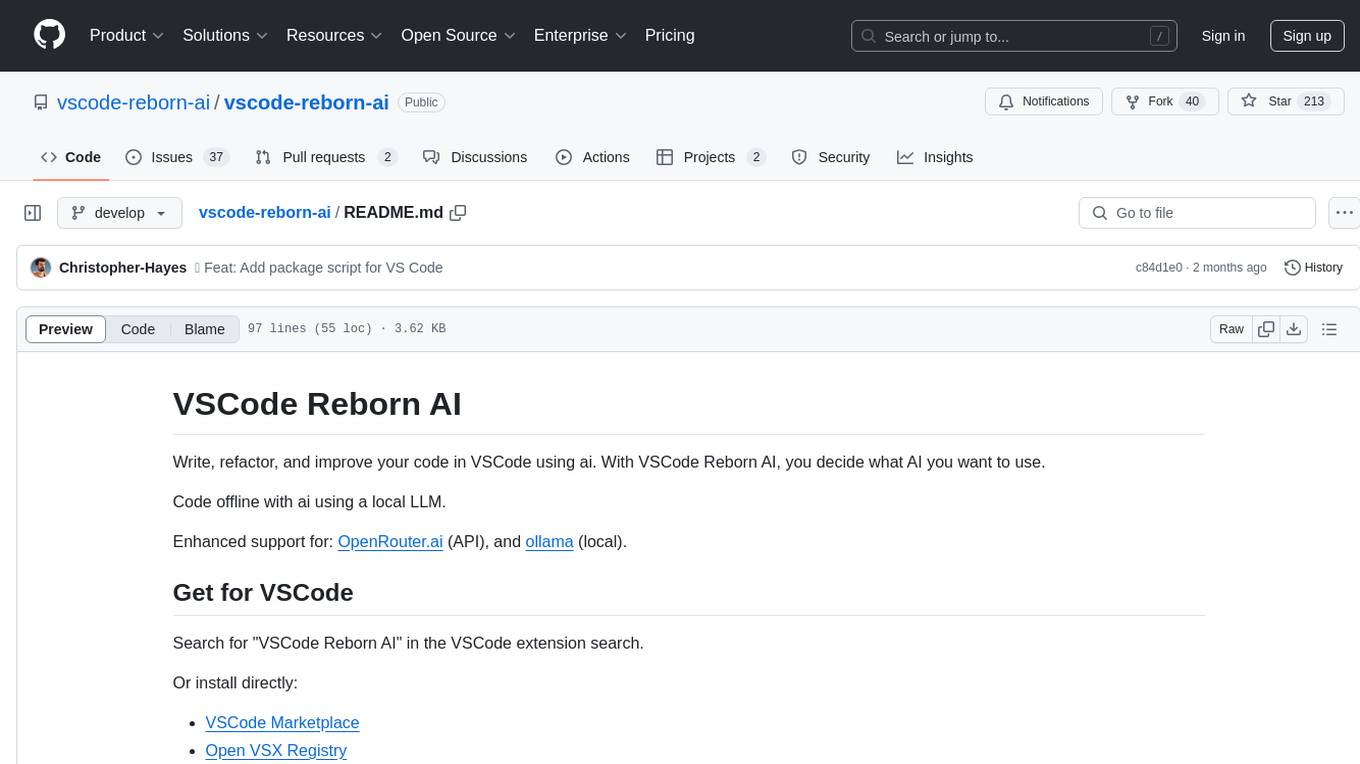
vscode-reborn-ai
VSCode Reborn AI is a tool that allows users to write, refactor, and improve code in Visual Studio Code using artificial intelligence. Users can work offline with AI using a local LLM. The tool provides enhanced support for OpenRouter.ai API and ollama. It also offers compatibility with various local LLMs and alternative APIs. Additionally, it includes features such as internationalization, development setup instructions, testing in VS Code, packaging for VS Code, tech stack details, and licensing information.
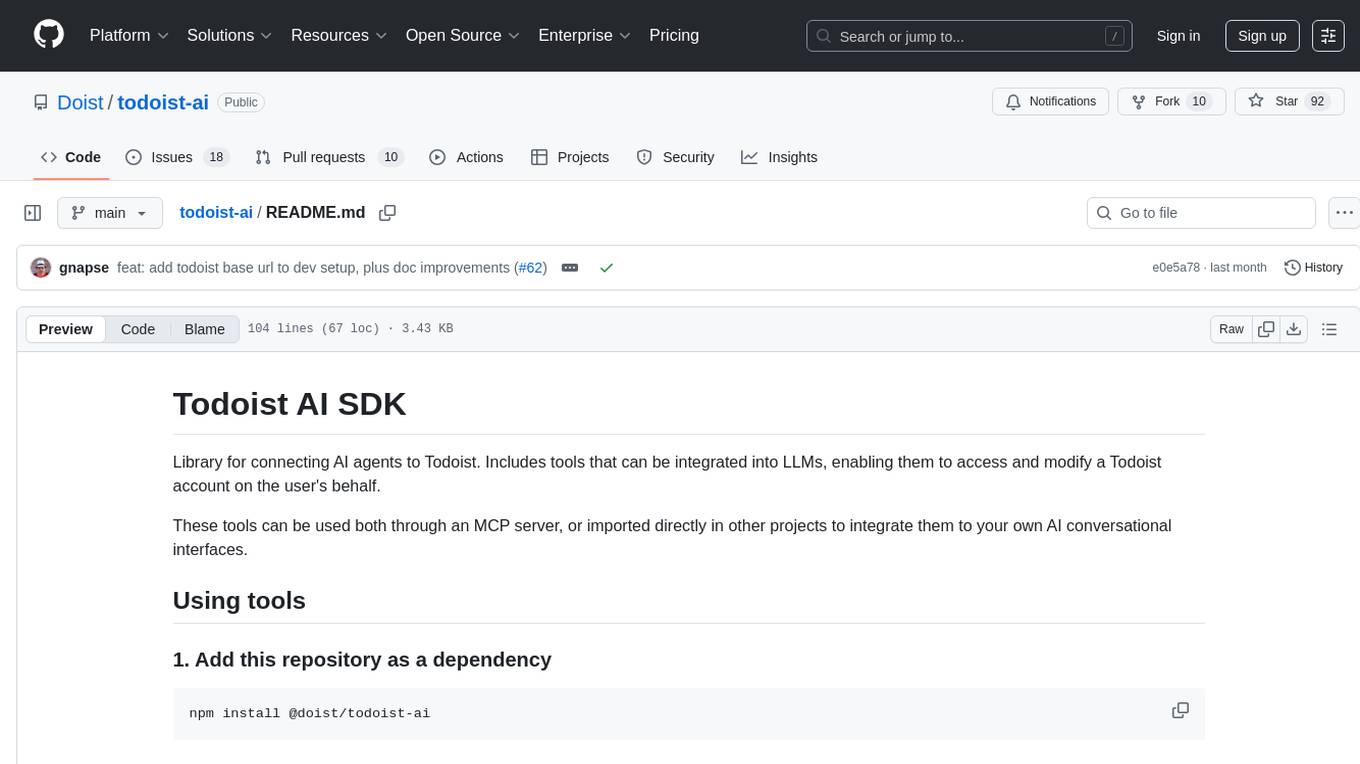
todoist-ai
Library for connecting AI agents to Todoist, enabling them to access and modify a Todoist account on the user's behalf. Tools can be used through an MCP server or integrated into other projects for AI conversational interfaces. Reusable tools allow for complete workflows, balancing flexibility and efficiency for LLMs. Early-stage project with more tools planned. Designed to provide a small set of tools for various AI interfaces.

fasttrackml
FastTrackML is an experiment tracking server focused on speed and scalability, fully compatible with MLFlow. It provides a user-friendly interface to track and visualize your machine learning experiments, making it easy to compare different models and identify the best performing ones. FastTrackML is open source and can be easily installed and run with pip or Docker. It is also compatible with the MLFlow Python package, making it easy to integrate with your existing MLFlow workflows.
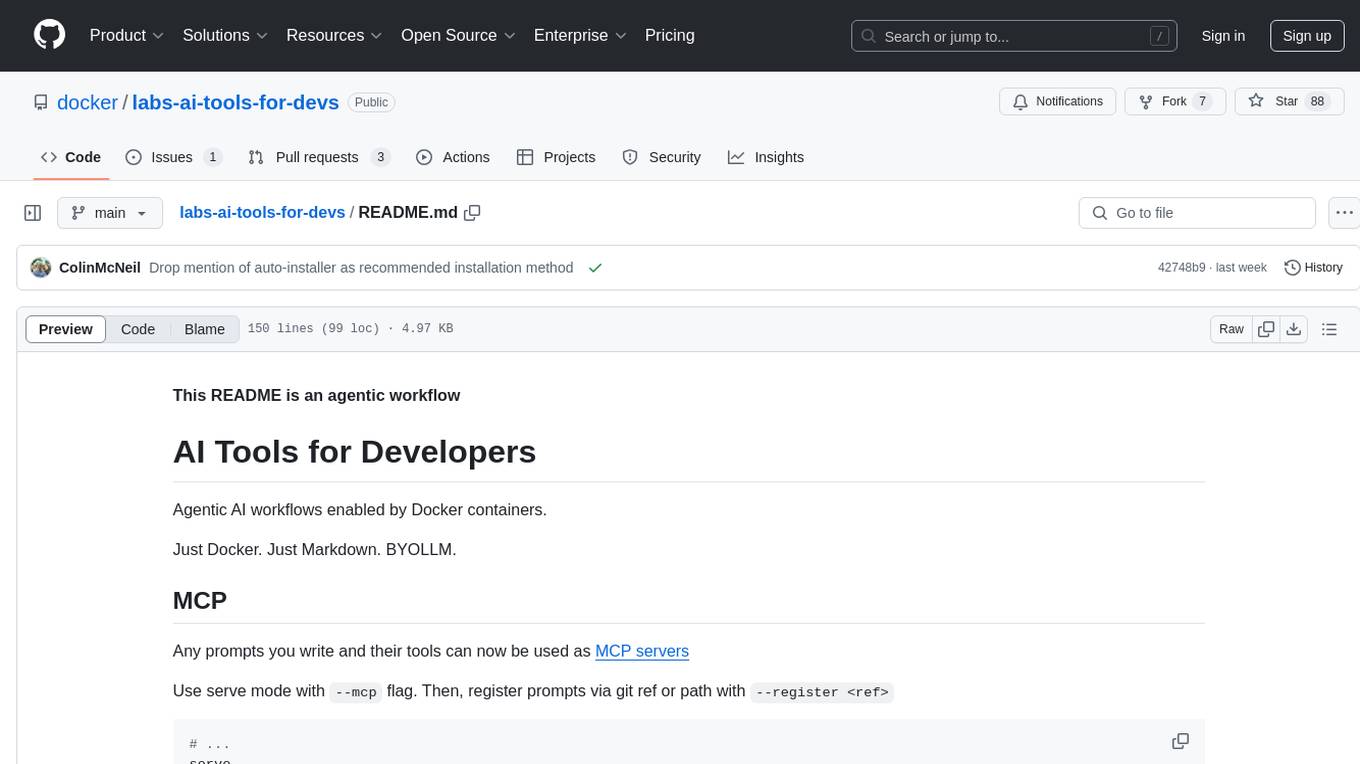
labs-ai-tools-for-devs
This repository provides AI tools for developers through Docker containers, enabling agentic workflows. It allows users to create complex workflows using Dockerized tools and Markdown, leveraging various LLM models. The core features include Dockerized tools, conversation loops, multi-model agents, project-first design, and trackable prompts stored in a git repo.

jupyter-ai
Jupyter AI connects generative AI with Jupyter notebooks. It provides a user-friendly and powerful way to explore generative AI models in notebooks and improve your productivity in JupyterLab and the Jupyter Notebook. Specifically, Jupyter AI offers: * An `%%ai` magic that turns the Jupyter notebook into a reproducible generative AI playground. This works anywhere the IPython kernel runs (JupyterLab, Jupyter Notebook, Google Colab, Kaggle, VSCode, etc.). * A native chat UI in JupyterLab that enables you to work with generative AI as a conversational assistant. * Support for a wide range of generative model providers, including AI21, Anthropic, AWS, Cohere, Gemini, Hugging Face, NVIDIA, and OpenAI. * Local model support through GPT4All, enabling use of generative AI models on consumer grade machines with ease and privacy.
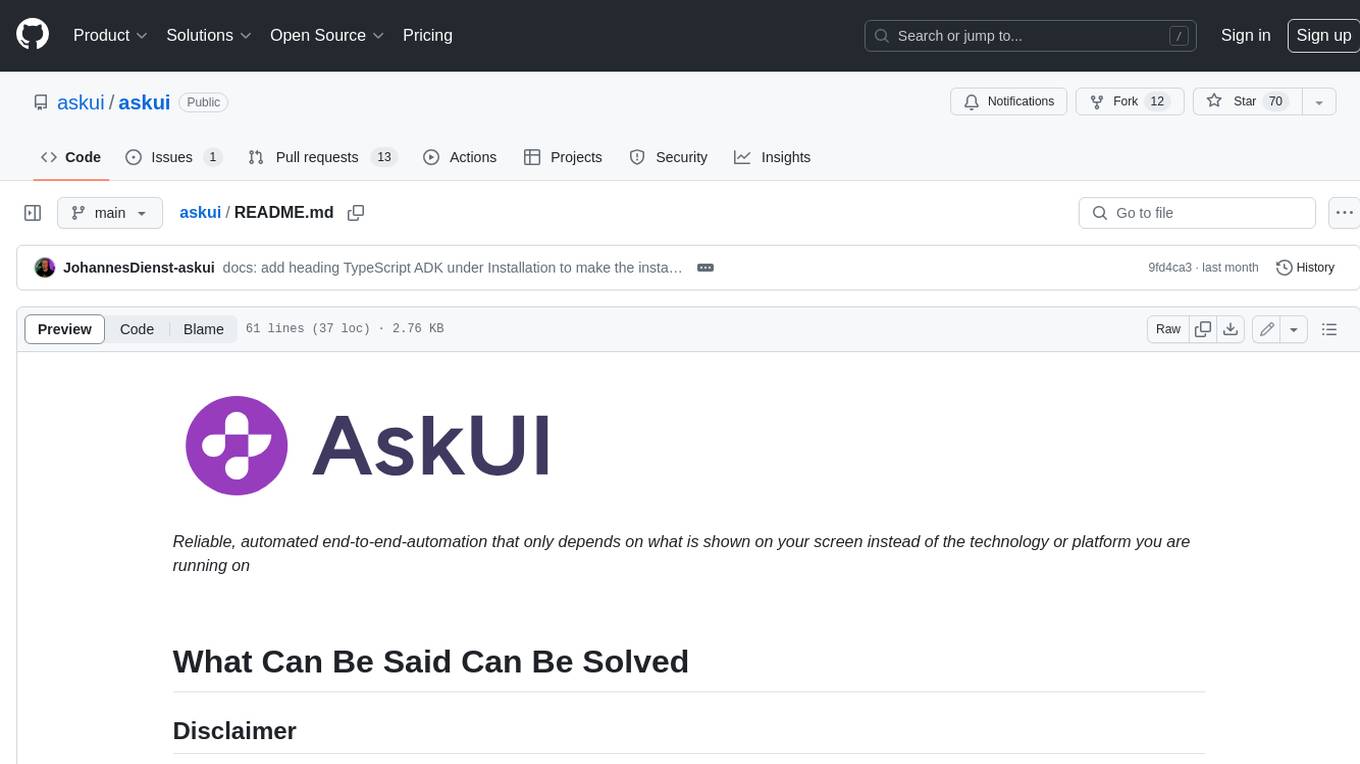
askui
AskUI is a reliable, automated end-to-end automation tool that only depends on what is shown on your screen instead of the technology or platform you are running on.

chatbot-ui
Chatbot UI is an open-source AI chat app that allows users to create and deploy their own AI chatbots. It is easy to use and can be customized to fit any need. Chatbot UI is perfect for businesses, developers, and anyone who wants to create a chatbot.
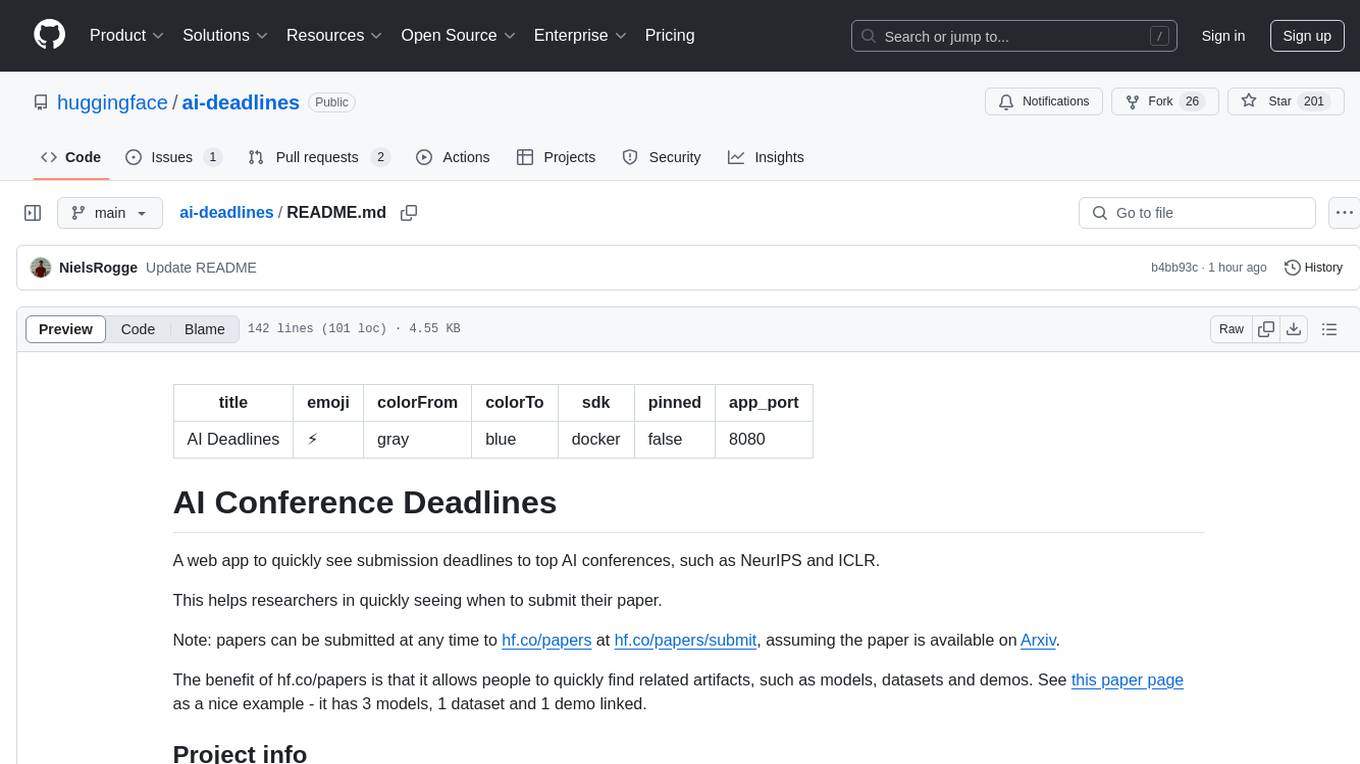
ai-deadlines
AI Deadlines is a web app that displays submission deadlines for top AI conferences like NeurIPS and ICLR. It helps researchers know when to submit their papers. The data is fetched from a GitHub repository and updated automatically using a CRON job. The project is based on an existing repository and features a new UI. Users can contribute by updating conference deadlines in the provided YAML file. The app can be run locally with Node.js and npm or deployed using Docker. It is built with Vite, TypeScript, React, shadcn-ui, and Tailwind CSS. The project is licensed under MIT.
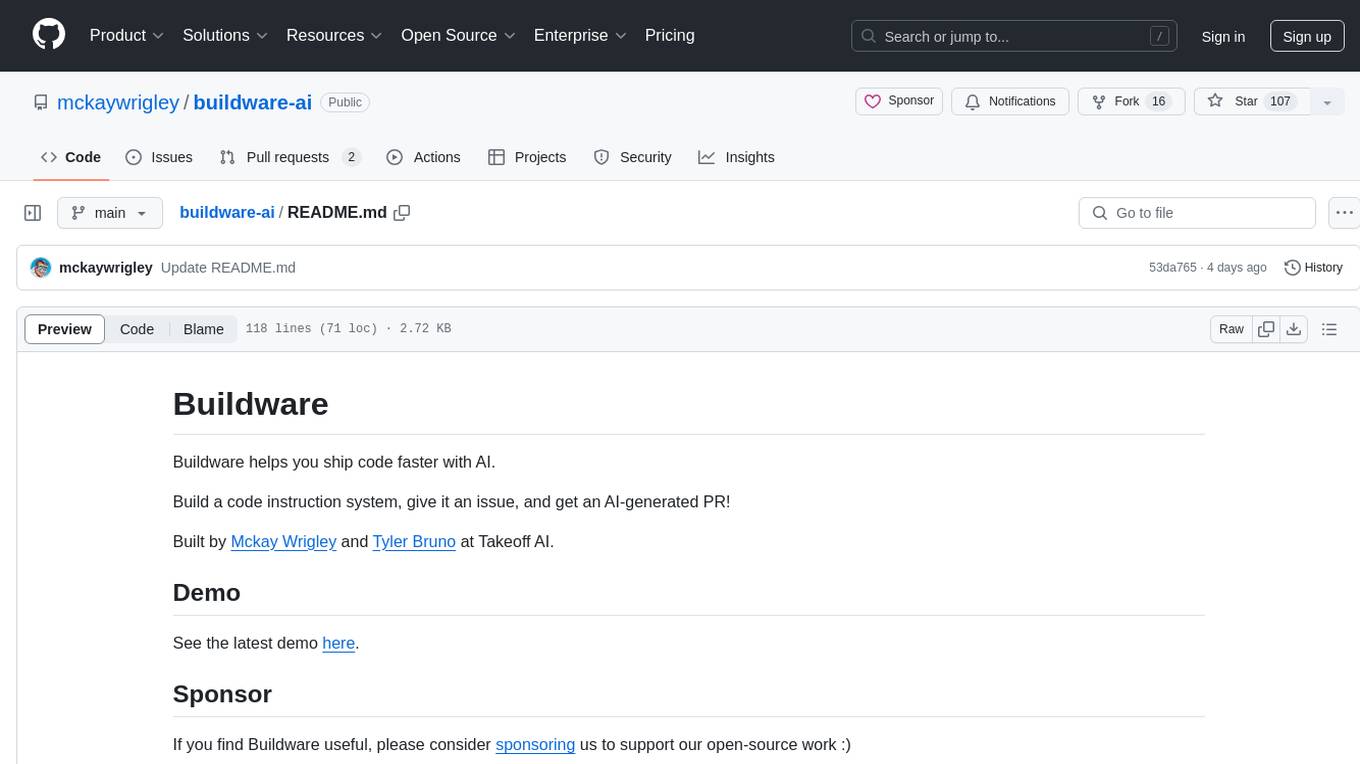
buildware-ai
Buildware is a tool designed to help developers accelerate their code shipping process by leveraging AI technology. Users can build a code instruction system, submit an issue, and receive an AI-generated pull request. The tool is created by Mckay Wrigley and Tyler Bruno at Takeoff AI. Buildware offers a simple setup process involving cloning the repository, installing dependencies, setting up environment variables, configuring a database, and obtaining a GitHub Personal Access Token (PAT). The tool is currently being updated to include advanced features such as Linear integration, local codebase mode, and team support.
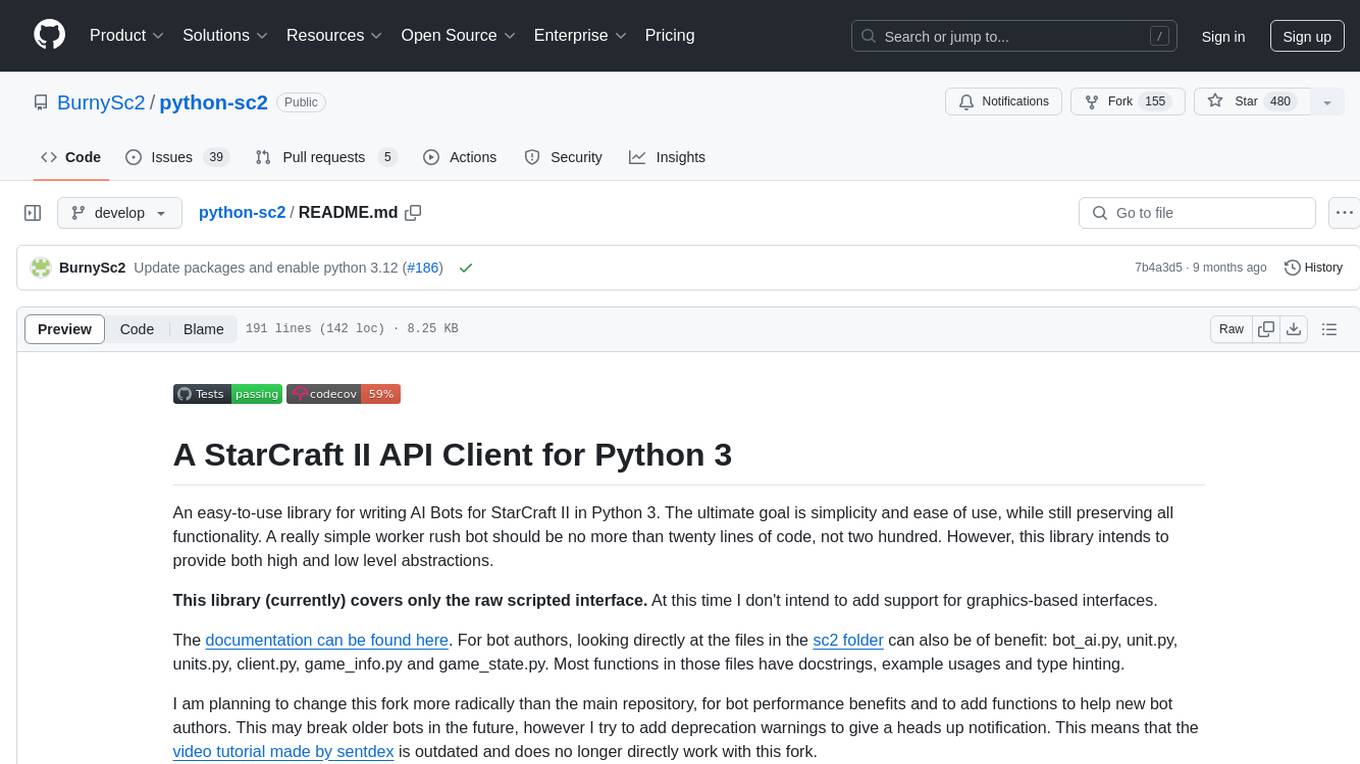
python-sc2
python-sc2 is an easy-to-use library for writing AI Bots for StarCraft II in Python 3. It aims for simplicity and ease of use while providing both high and low level abstractions. The library covers only the raw scripted interface and intends to help new bot authors with added functions. Users can install the library using pip and need a StarCraft II executable to run bots. The API configuration options allow users to customize bot behavior and performance. The community provides support through Discord servers, and users can contribute to the project by creating new issues or pull requests following style guidelines.
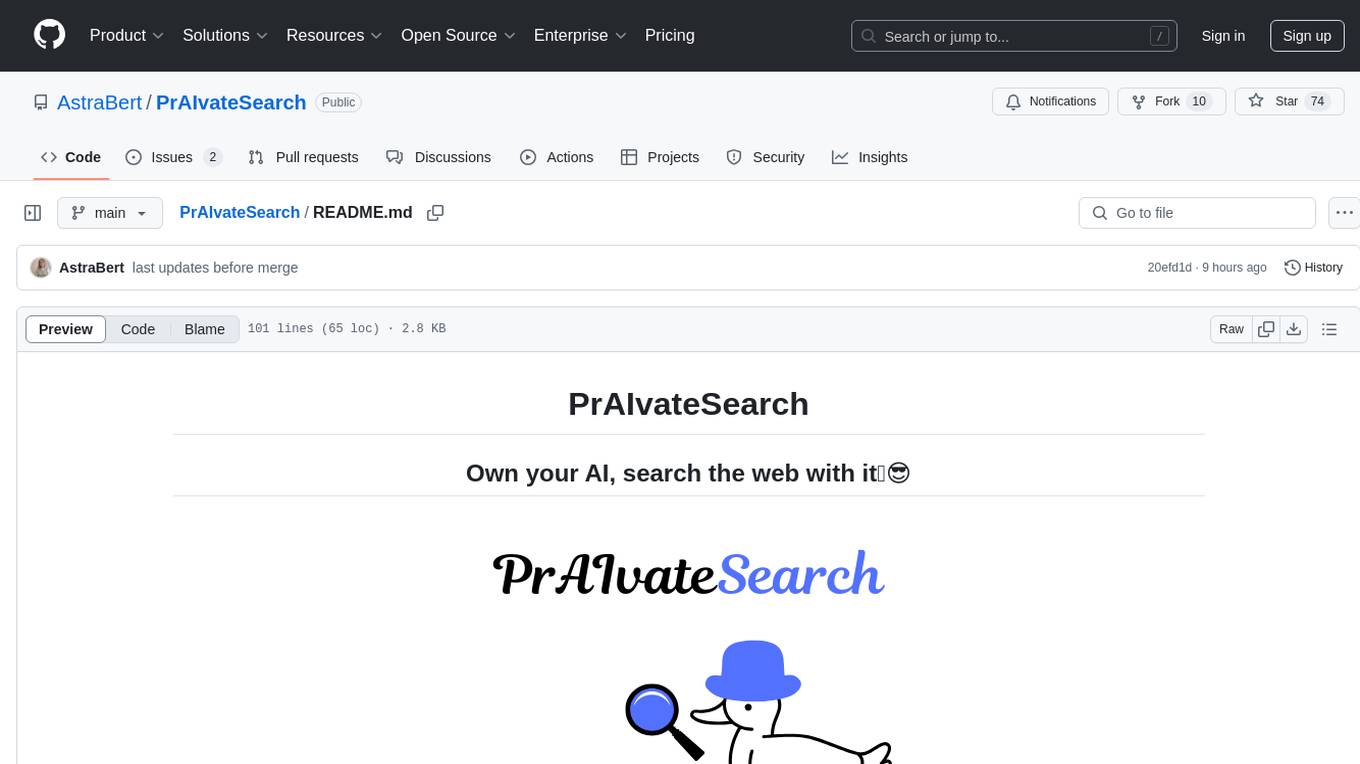
PrAIvateSearch
PrAIvateSearch is a NextJS web application that aims to implement similar features to SearchGPT in an open-source, local, and private way. It allows users to search the web using their own AI model. The application provides a user-friendly interface for interacting with the AI model and accessing search results. PrAIvateSearch is designed to be easy to install and use, with detailed instructions provided in the readme file. The project is in beta stage and welcomes contributions from the community to improve and enhance its functionality. Users are encouraged to support the project through funding to help it grow and continue to be maintained as an open-source tool under the MIT license.
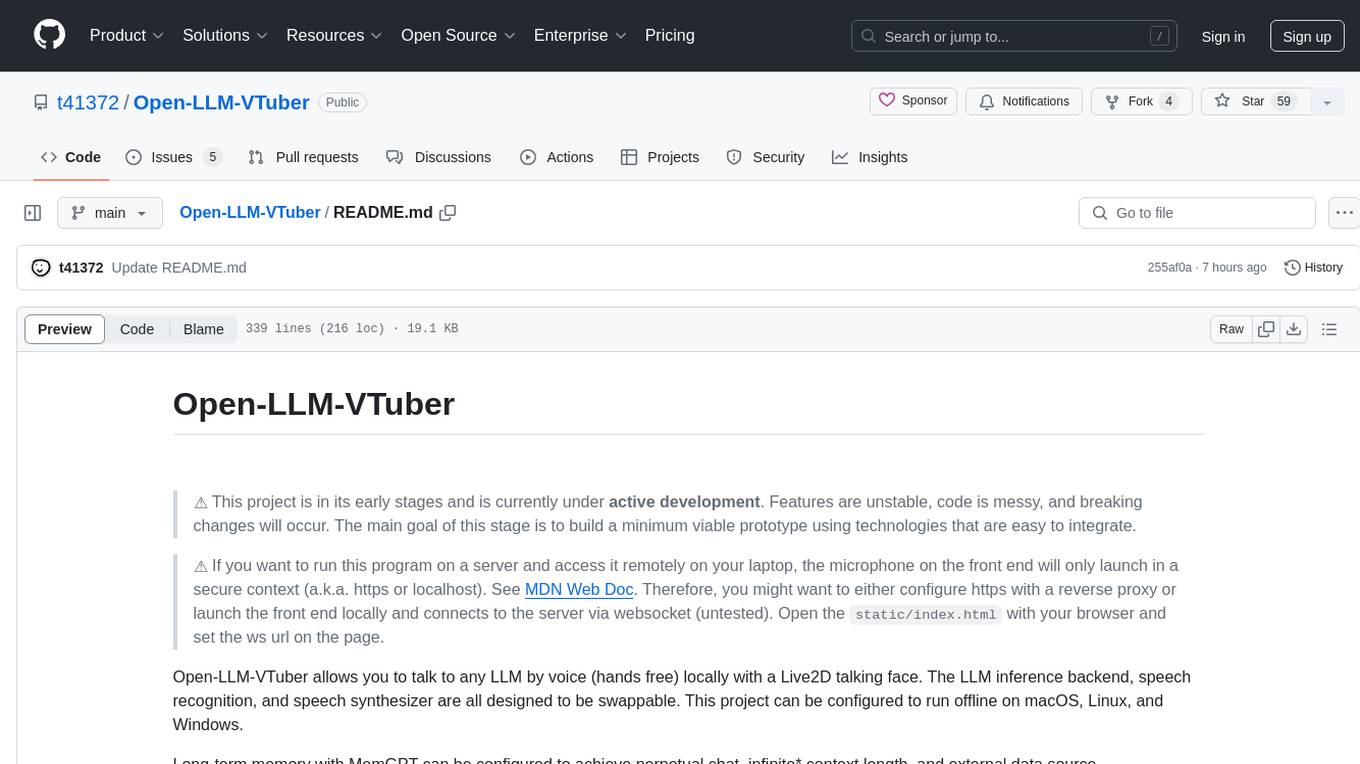
Open-LLM-VTuber
Open-LLM-VTuber is a project in early stages of development that allows users to interact with Large Language Models (LLM) using voice commands and receive responses through a Live2D talking face. The project aims to provide a minimum viable prototype for offline use on macOS, Linux, and Windows, with features like long-term memory using MemGPT, customizable LLM backends, speech recognition, and text-to-speech providers. Users can configure the project to chat with LLMs, choose different backend services, and utilize Live2D models for visual representation. The project supports perpetual chat, offline operation, and GPU acceleration on macOS, addressing limitations of existing solutions on macOS.
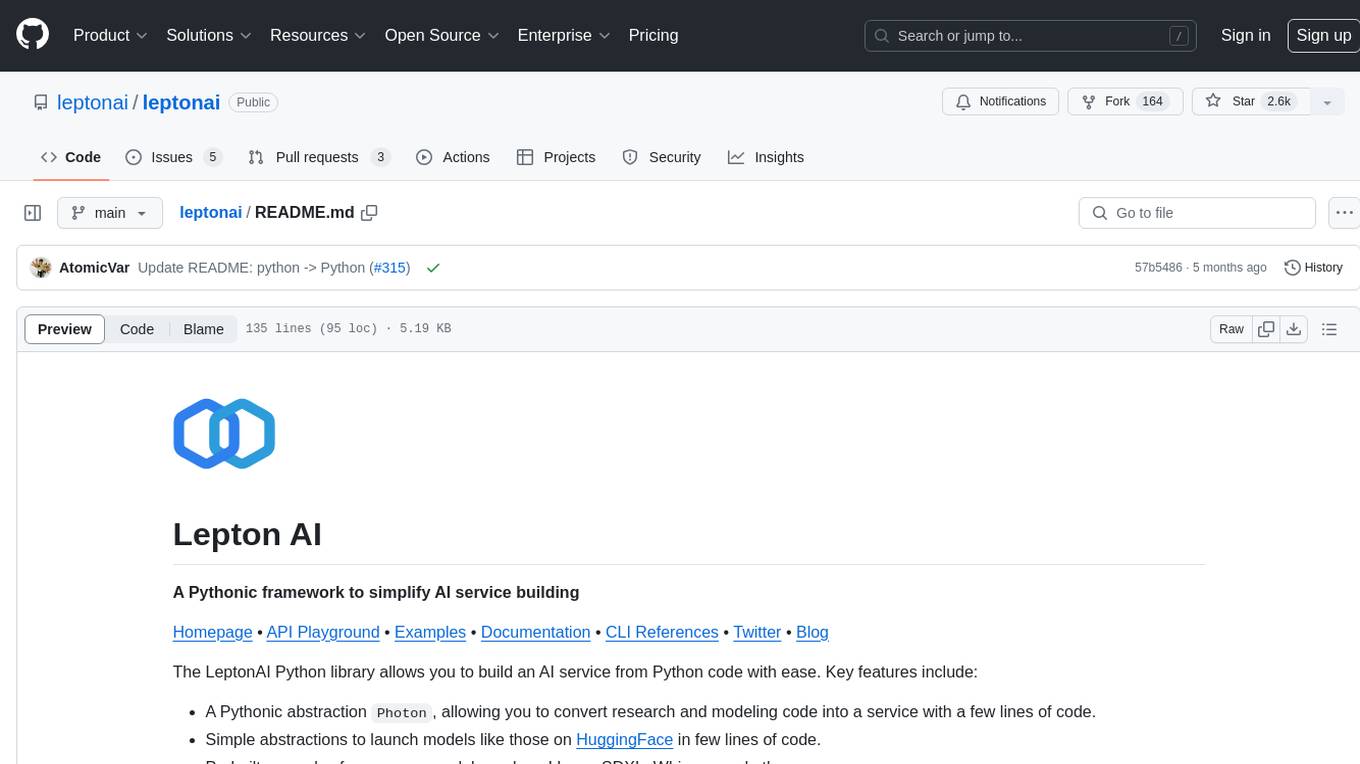
leptonai
A Pythonic framework to simplify AI service building. The LeptonAI Python library allows you to build an AI service from Python code with ease. Key features include a Pythonic abstraction Photon, simple abstractions to launch models like those on HuggingFace, prebuilt examples for common models, AI tailored batteries, a client to automatically call your service like native Python functions, and Pythonic configuration specs to be readily shipped in a cloud environment.
For similar tasks

xef
xef.ai is a one-stop library designed to bring the power of modern AI to applications and services. It offers integration with Large Language Models (LLM), image generation, and other AI services. The library is packaged in two layers: core libraries for basic AI services integration and integrations with other libraries. xef.ai aims to simplify the transition to modern AI for developers by providing an idiomatic interface, currently supporting Kotlin. Inspired by LangChain and Hugging Face, xef.ai may transmit source code and user input data to third-party services, so users should review privacy policies and take precautions. Libraries are available in Maven Central under the `com.xebia` group, with `xef-core` as the core library. Developers can add these libraries to their projects and explore examples to understand usage.
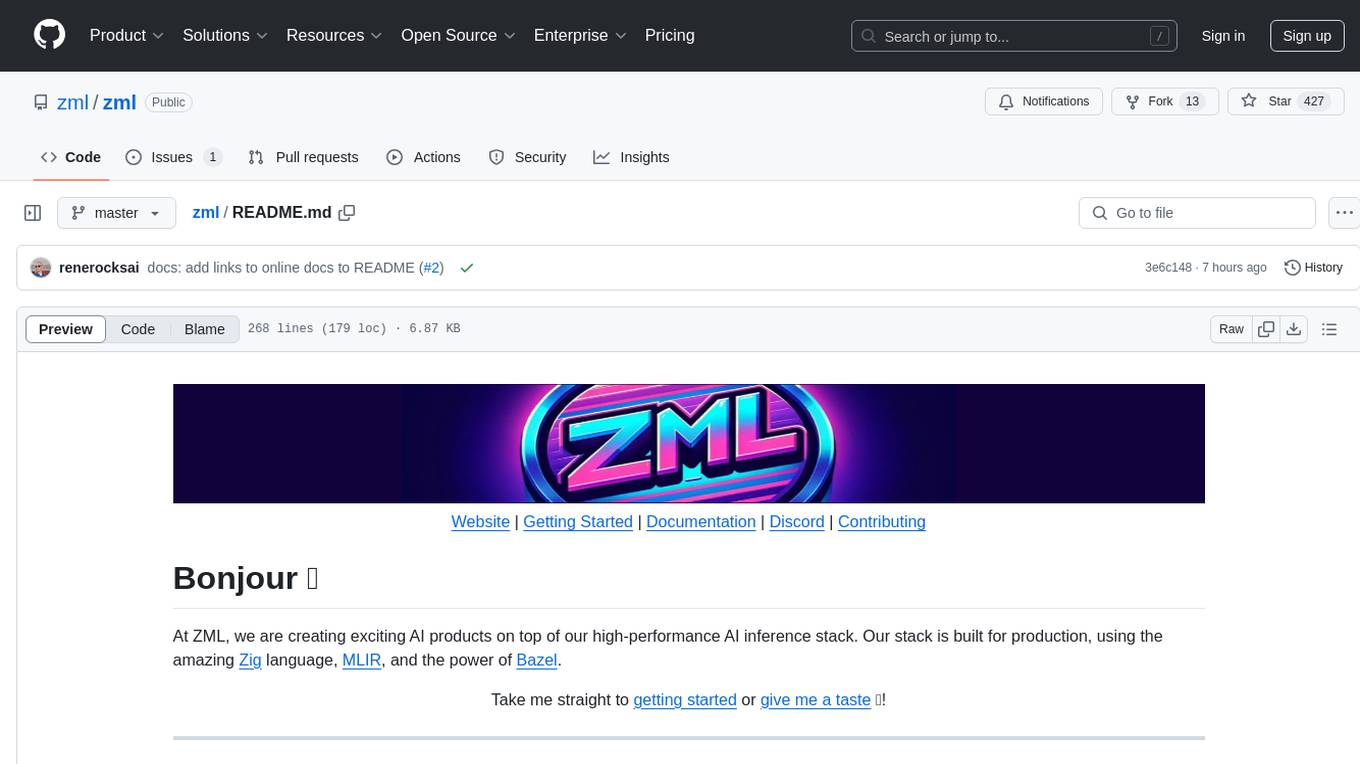
zml
ZML is a high-performance AI inference stack built for production, using Zig language, MLIR, and Bazel. It allows users to create exciting AI projects, run pre-packaged models like MNIST, TinyLlama, OpenLLama, and Meta Llama, and compile models for accelerator runtimes. Users can also run tests, explore examples, and contribute to the project. ZML is licensed under the Apache 2.0 license.

ai-hero
AI Hero is a course designed to help individuals transition from frontend, backend, or full-stack development to working with AI. The course includes examples, exercises, libraries & SDKs, and articles. The repository provides self-contained code samples to demonstrate various AI concepts and techniques. Users can follow the quickstart guide to install dependencies, set up API keys, and run examples. AI Hero aims to equip learners with the skills needed to become fully-fledged AI engineers.
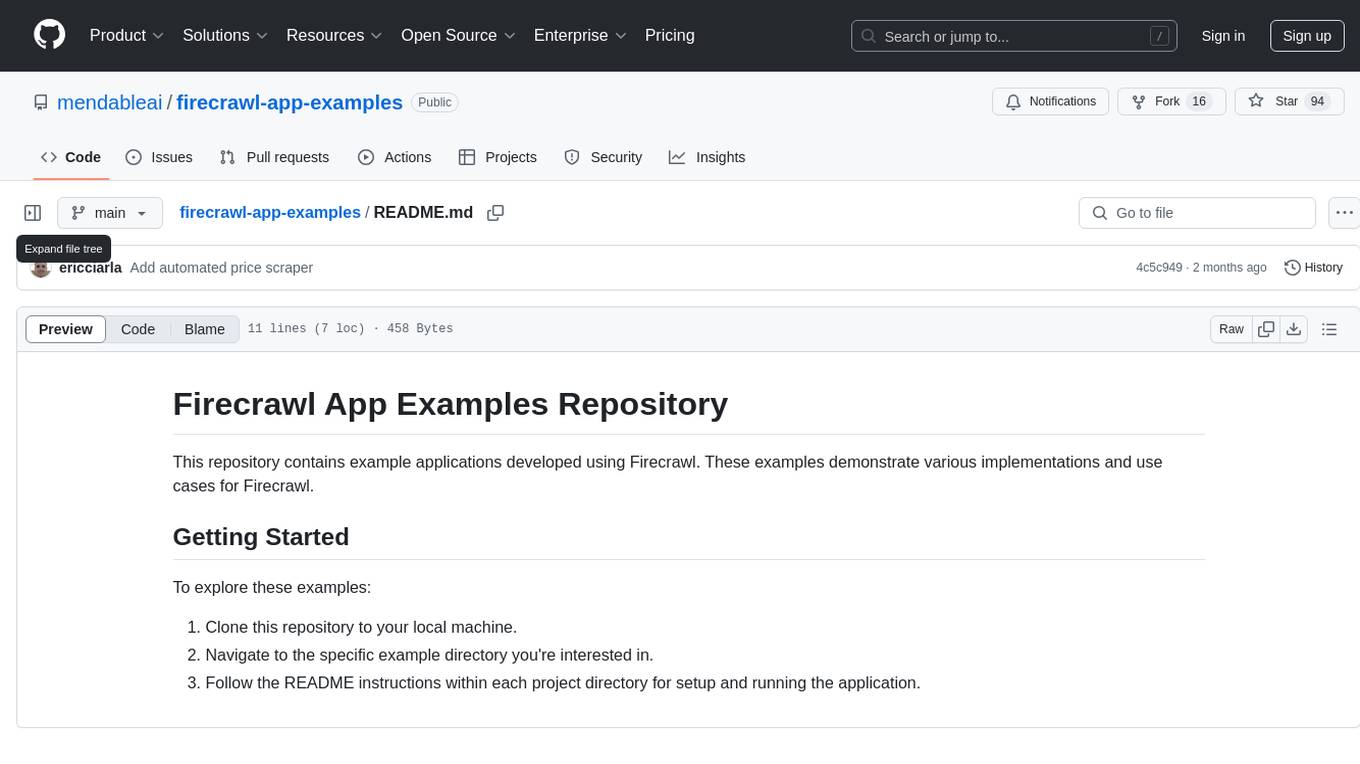
firecrawl-app-examples
Firecrawl App Examples Repository contains example applications developed using Firecrawl, demonstrating various implementations and use cases for Firecrawl.
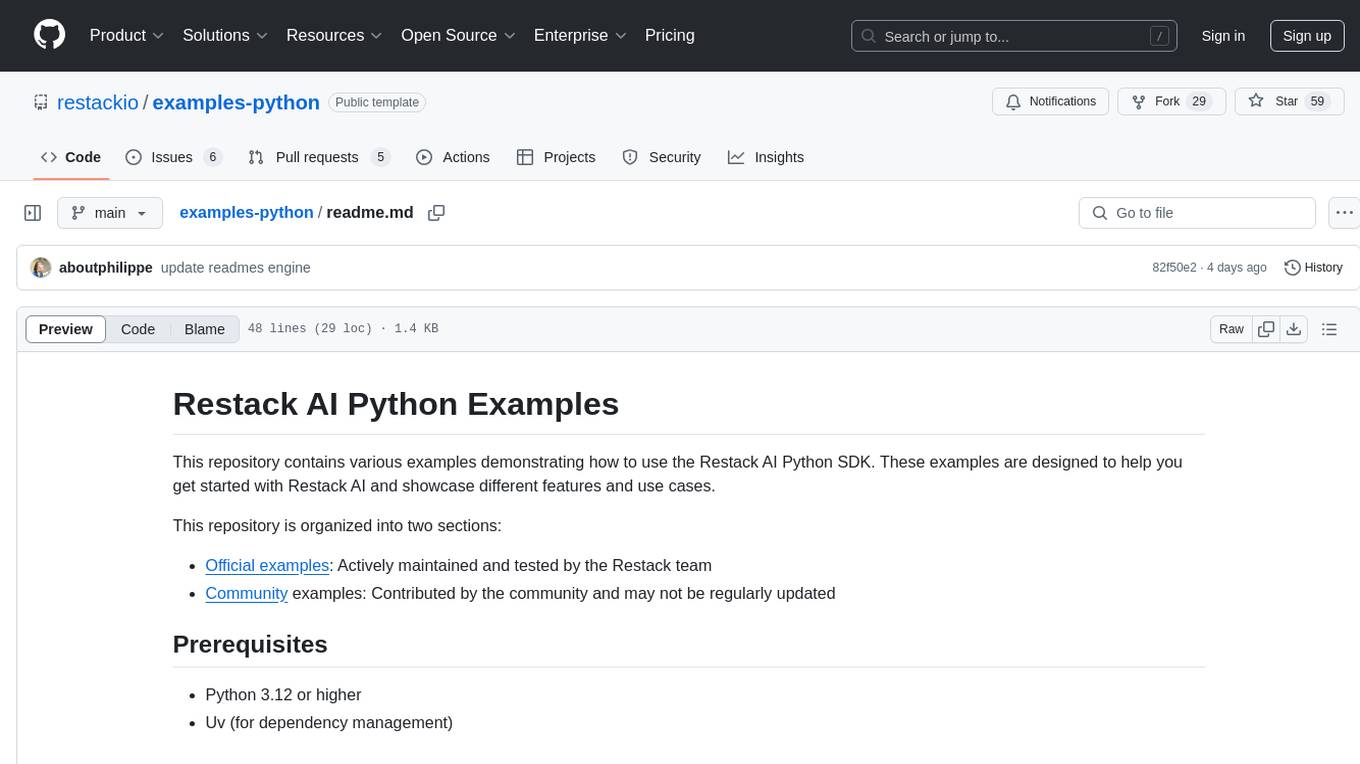
examples-python
This repository contains various examples demonstrating how to use the Restack AI Python SDK. It is organized into official examples maintained by the Restack team and community examples contributed by the community. The examples are designed to help users get started with Restack AI and showcase different features and use cases. Users can explore different examples, follow specific instructions in each example's README file, and contribute to the repository by adding new examples or improving existing ones.
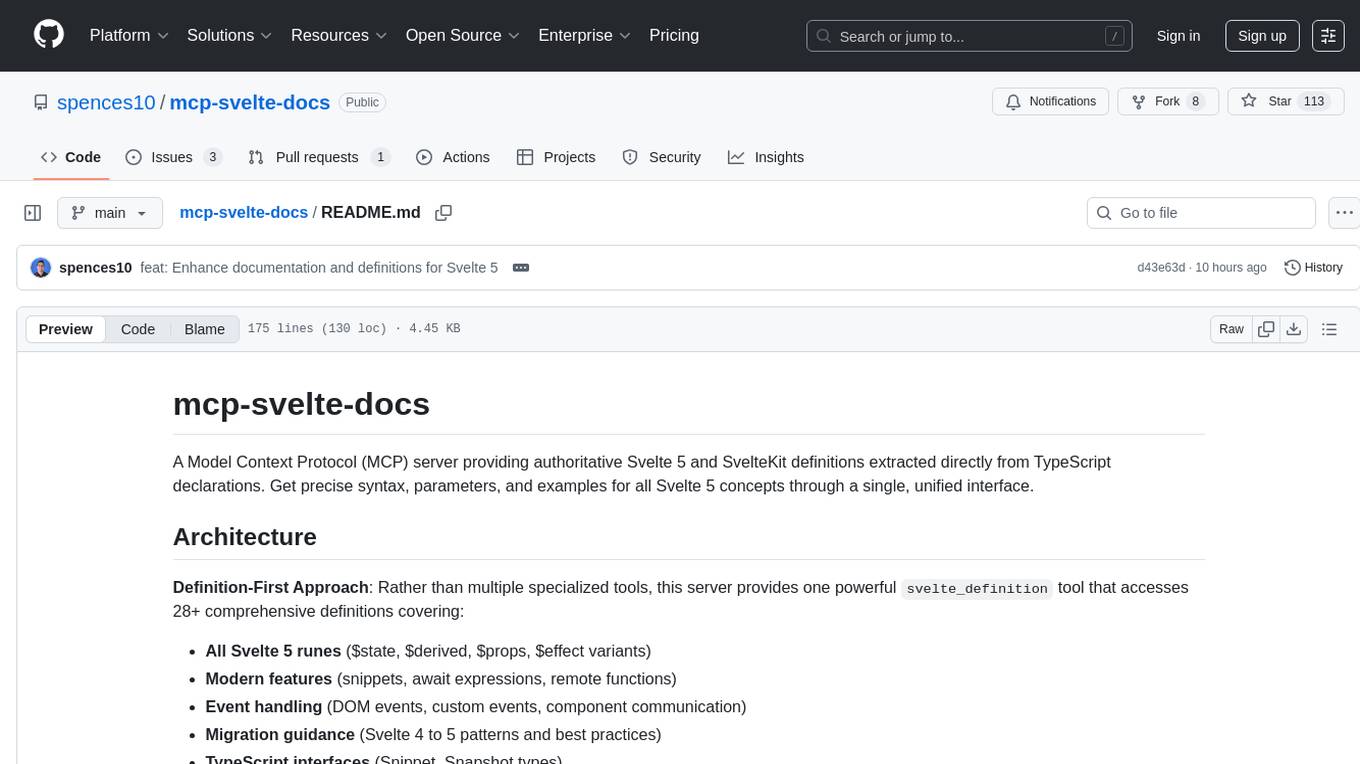
mcp-svelte-docs
A Model Context Protocol (MCP) server providing authoritative Svelte 5 and SvelteKit definitions extracted directly from TypeScript declarations. Get precise syntax, parameters, and examples for all Svelte 5 concepts through a single, unified interface. The server offers a 'svelte_definition' tool that covers various Svelte 5 runes, modern features, event handling, migration guidance, TypeScript interfaces, and advanced patterns. It aims to provide up-to-date, type-safe, and comprehensive documentation for Svelte developers.
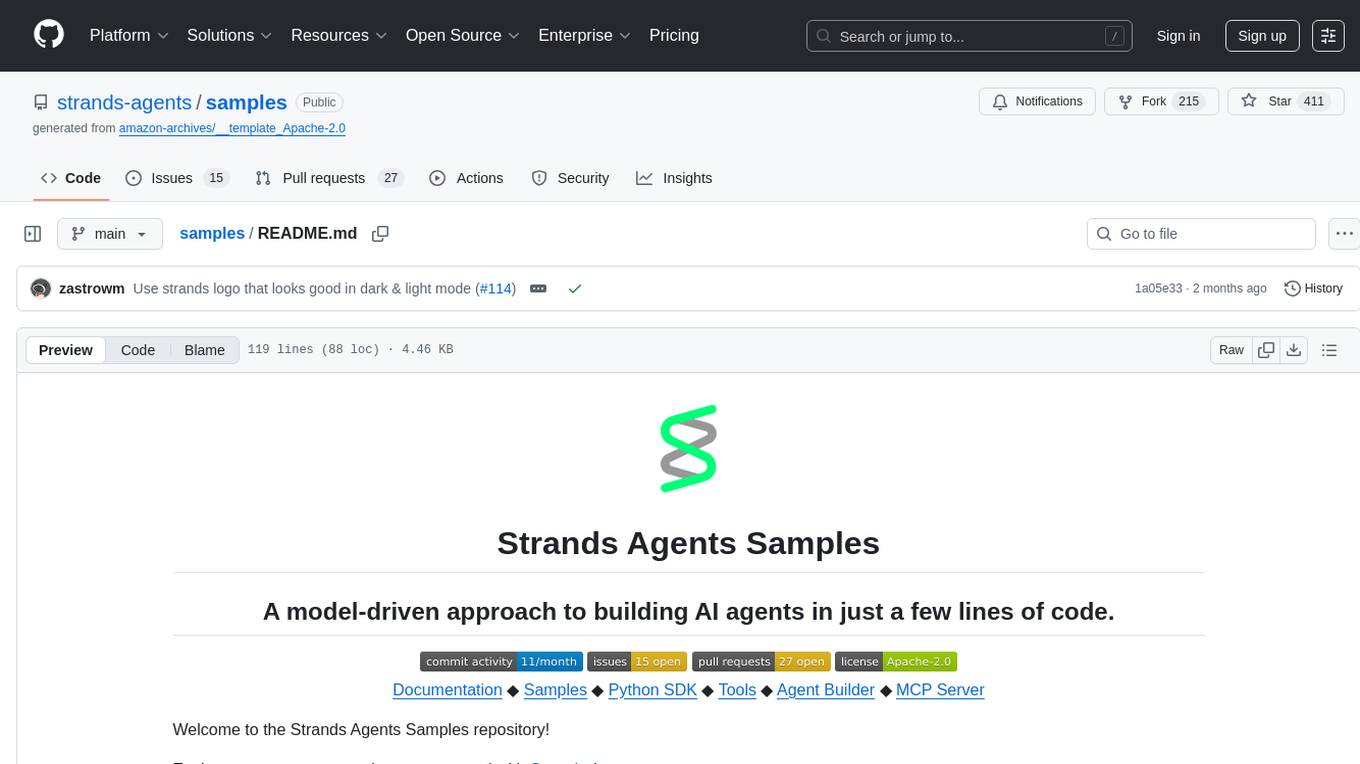
samples
Strands Agents Samples is a repository showcasing easy-to-use examples for building AI agents using a model-driven approach. The examples provided are for demonstration and educational purposes only, not intended for direct production use. Users can explore various samples to understand concepts and techniques, ensuring proper security and testing procedures before implementation.
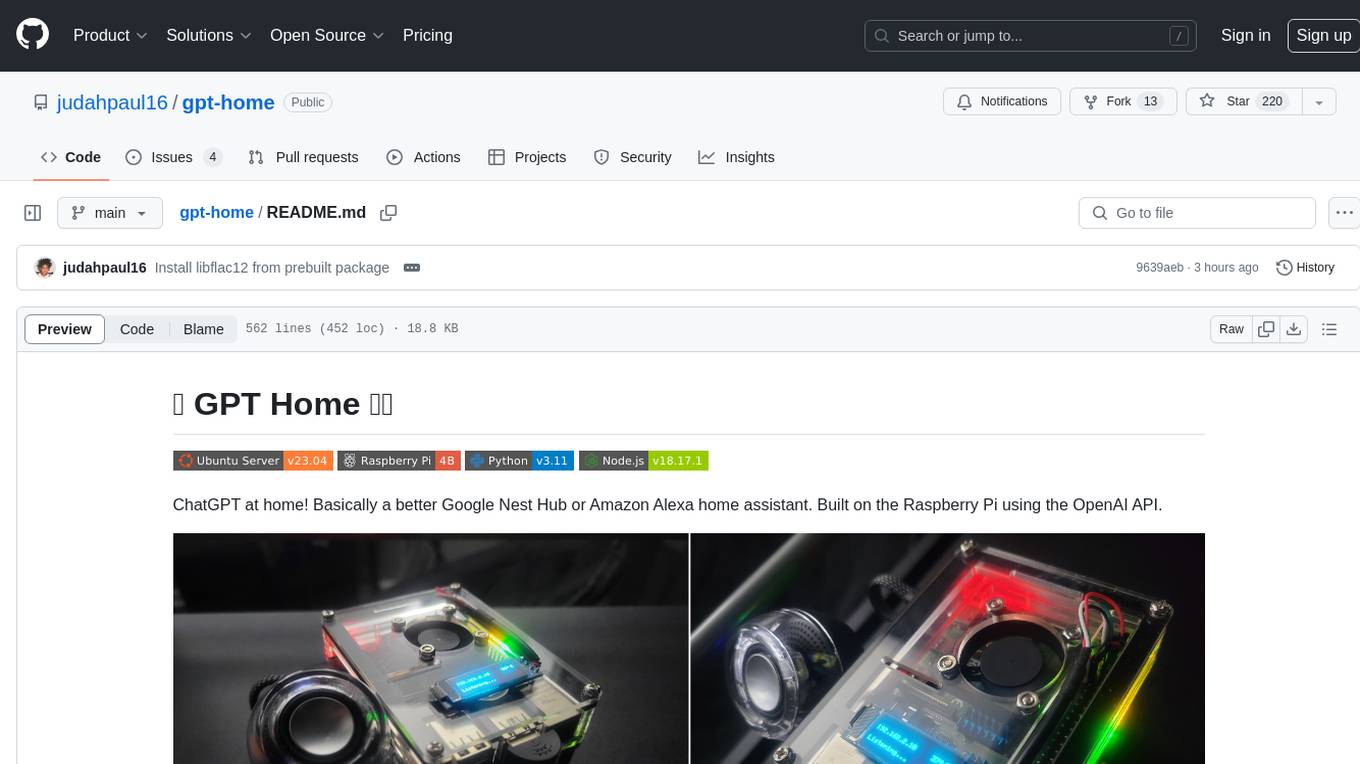
gpt-home
GPT Home is a project that allows users to build their own home assistant using Raspberry Pi and OpenAI API. It serves as a guide for setting up a smart home assistant similar to Google Nest Hub or Amazon Alexa. The project integrates various components like OpenAI, Spotify, Philips Hue, and OpenWeatherMap to provide a personalized home assistant experience. Users can follow the detailed instructions provided to build their own version of the home assistant on Raspberry Pi, with optional components for customization. The project also includes system configurations, dependencies installation, and setup scripts for easy deployment. Overall, GPT Home offers a DIY solution for creating a smart home assistant using Raspberry Pi and OpenAI technology.
For similar jobs

sweep
Sweep is an AI junior developer that turns bugs and feature requests into code changes. It automatically handles developer experience improvements like adding type hints and improving test coverage.

teams-ai
The Teams AI Library is a software development kit (SDK) that helps developers create bots that can interact with Teams and Microsoft 365 applications. It is built on top of the Bot Framework SDK and simplifies the process of developing bots that interact with Teams' artificial intelligence capabilities. The SDK is available for JavaScript/TypeScript, .NET, and Python.

ai-guide
This guide is dedicated to Large Language Models (LLMs) that you can run on your home computer. It assumes your PC is a lower-end, non-gaming setup.

classifai
Supercharge WordPress Content Workflows and Engagement with Artificial Intelligence. Tap into leading cloud-based services like OpenAI, Microsoft Azure AI, Google Gemini and IBM Watson to augment your WordPress-powered websites. Publish content faster while improving SEO performance and increasing audience engagement. ClassifAI integrates Artificial Intelligence and Machine Learning technologies to lighten your workload and eliminate tedious tasks, giving you more time to create original content that matters.

chatbot-ui
Chatbot UI is an open-source AI chat app that allows users to create and deploy their own AI chatbots. It is easy to use and can be customized to fit any need. Chatbot UI is perfect for businesses, developers, and anyone who wants to create a chatbot.

BricksLLM
BricksLLM is a cloud native AI gateway written in Go. Currently, it provides native support for OpenAI, Anthropic, Azure OpenAI and vLLM. BricksLLM aims to provide enterprise level infrastructure that can power any LLM production use cases. Here are some use cases for BricksLLM: * Set LLM usage limits for users on different pricing tiers * Track LLM usage on a per user and per organization basis * Block or redact requests containing PIIs * Improve LLM reliability with failovers, retries and caching * Distribute API keys with rate limits and cost limits for internal development/production use cases * Distribute API keys with rate limits and cost limits for students

uAgents
uAgents is a Python library developed by Fetch.ai that allows for the creation of autonomous AI agents. These agents can perform various tasks on a schedule or take action on various events. uAgents are easy to create and manage, and they are connected to a fast-growing network of other uAgents. They are also secure, with cryptographically secured messages and wallets.

griptape
Griptape is a modular Python framework for building AI-powered applications that securely connect to your enterprise data and APIs. It offers developers the ability to maintain control and flexibility at every step. Griptape's core components include Structures (Agents, Pipelines, and Workflows), Tasks, Tools, Memory (Conversation Memory, Task Memory, and Meta Memory), Drivers (Prompt and Embedding Drivers, Vector Store Drivers, Image Generation Drivers, Image Query Drivers, SQL Drivers, Web Scraper Drivers, and Conversation Memory Drivers), Engines (Query Engines, Extraction Engines, Summary Engines, Image Generation Engines, and Image Query Engines), and additional components (Rulesets, Loaders, Artifacts, Chunkers, and Tokenizers). Griptape enables developers to create AI-powered applications with ease and efficiency.